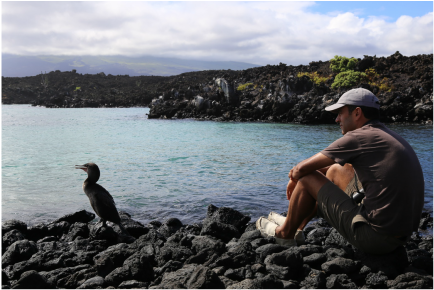Carlos Daniel Cadena
Professor
Dean, School of Sciences
|
Ph.D. Biology, 2006, University of Missouri-St. Louis B.Sc. Biology, 2000, Universidad de los Andes Departamento de Ciencias Biológicas Universidad de los Andes Of. A-306 Tel. 3394949 ext. 2072 ccadena[at]uniandes.edu.co Google Scholar Profile |
I am broadly interested in the evolution, systematics and evolutionary ecology of vertebrates, with a special focus on Neotropical birds. My research cuts across different ecological, temporal and spatial scales to address evolutionary questions, with studies ranging from genetic, mechanistic and behavioral approaches to understanding adaptation of organisms to their environment, to the role that large-scale evolutionary processes play in establishing spatial patterns of species richness. Main research areas in my lab currently focus on (1) natural selection and adaptation of organismal traits to varying environments and the link between adaptation and speciation along elevational and other environmental gradients, (2) the ecology and evolution of avian migration, (3) comparative phylogeography as a tool to understand the history of Neotropical diversification, and (4) the link between evolutionary/historical processes of speciation, extinction and immigration, and the structure of ecological assemblages and spatial patterns of species diversity.
My projects and those of my students involve (1) fieldwork focused on collecting material for analysis (e.g. specimens, recordings, tissue samples to assess isotopic composition and infection by parasites) and on performing in-situ measurements and experiments (physiological state, responses to song playback), (2) genetic and genomic analyses to understand the molecular bases of adaptation and speciation, (3) reconstruction of molecular phylogenies and analyses of comparative phylogeography and population genetics, (4) museum-based analyses of phenotypic variation, and (5) several applications of spatial tools (geographic information systems, radio telemetry, environmental and distributional databases) and comparative methods to address ecological and evolutionary questions.
My projects and those of my students involve (1) fieldwork focused on collecting material for analysis (e.g. specimens, recordings, tissue samples to assess isotopic composition and infection by parasites) and on performing in-situ measurements and experiments (physiological state, responses to song playback), (2) genetic and genomic analyses to understand the molecular bases of adaptation and speciation, (3) reconstruction of molecular phylogenies and analyses of comparative phylogeography and population genetics, (4) museum-based analyses of phenotypic variation, and (5) several applications of spatial tools (geographic information systems, radio telemetry, environmental and distributional databases) and comparative methods to address ecological and evolutionary questions.
Universidad de los Andes | Vigilada Mineducación | Reconocimiento como Universidad: Decreto 1297 del 30 de mayo de 1964 | Reconocimiento personería jurídica: Resolución 28 del 23 de febrero de 1949 Minjusticia.

